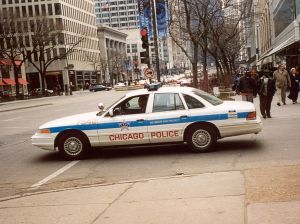Illinois Cook County Sheriff’s officers arrested a Minneapolis man in March after a traffic stop revealed that the man had 25 pounds of crystal methamphetamine in his vehicle. Officers pulled the vehicle over in Arlington Heights after observing it commit several traffic violations. The drugs were found after the driver consented to a police search; the driver was then arrested and charged with possession of a controlled substance with intent to deliver. The arrest raises several issues that an experienced drug possession attorney would explore to determine whether the police exceeded their authority in the search, seizure and arrest. Such a violation of the defendant’s rights could help get the charges dismissed or reduced.
Stop, Search and Seizure of Vehicle
Illinois police are permitted to stop a vehicle if they have reasonable suspicion to believe that the driver has committed a traffic violation. In this case, an experienced attorney would review police reports to determine whether the police had reasonable suspicion to believe that the driver did in fact commit a traffic violation. The police report should reveal what prompted the officers to pull the vehicle over; if no valid reason is included in the report, it could indicate that the police acted on a “hunch,” which does not qualify as reasonable suspicion. Lacking a reasonable suspicion, the stop and everything that followed would be a violation of the defendant’s Fourth Amendment right against unreasonable search and seizure, and may lead to outright dismissal of the charges.
Next comes the search. Police claim that the driver consented to the search. An attorney would again review the police report and discuss with the client how consent was given. There is a difference between if the officer asked, “Would you mind if I searched the vehicle?” or instead stated, “I’m going to need to search the vehicle.”
The first question implies that the driver had the right to refuse, which is the case in all police stops; there is no requirement that you answer the police officer’s questions, and you are always free to go on your way unless an arrest has been made. An arrest is made when you do not feel that you have the right to leave the scene.
The second statement, however, does not give the driver any indication that he is free to refuse the search and continue on his way. Consent is not freely given if the defendant feels that he cannot refuse. The search may also have been unreasonable if the reason for the stop did not warrant the search; for example, pulling the driver over for a broken taillight would not normally necessitate the search of a vehicle. If consent was not freely given, then discovery of the methamphetamines would be illegal. A motion to quash the arrest and suppress the evidence would be filed and the evidence would be deemed inadmissible in court, thus leading to an outright dismissal of the charges.
An attorney would also investigate to determine whether the police could prove that the drugs belonged to the driver. Was the car registered to him? If the driver borrowed a friend’s car and did not know it contained drugs, it may be possible to have the intent to deliver charge dismissed. If the car did belong to the driver, had he lent it to anybody recently who may have placed the drugs in the vehicle without his knowledge? If the drugs were planted by a third party, then the intent to deliver charge would have to be dismissed. Both of these scenarios would also negate the charge of intent to deliver.
The defendant in this case was also charged with intent to deliver, which carries stiff penalties; a conviction for possession of more than 900 grams of methamphetamine with intent to deliver is a Class X felony, which carries a possible prison sentence of 15 to 60 years and a maximum fine of $500,000 the street value of the drugs, whichever is greater.
An attorney will examine all the evidence to determine if any of the defendant’s rights were violated. If the evidence suggests a guilty verdict, he will zealously negotiate with prosecutors and the judge for a reduced sentence, or seek to reduce the charges or prison time in exchange for helping in an investigation of a larger drug ring. Continue reading
 Chicago Criminal Lawyer Blog
Chicago Criminal Lawyer Blog




